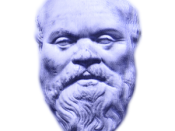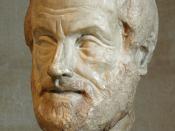Bravery, or andreia, as it was used in Aristotle's time, had the root meaning of manly. Bravery was a show of one's devotion to his city, and it was seen as the ultimate display of a man's virtue. Bravery is more complex than some of the other virtues, because it involves the feelings of fear and confidence, which require correct training. It is concerned with the art of mastering one's feelings in the face of danger. With this being the definition of bravery, we could argue that Aristotle would not have counted spirited individuals as exhibiting the virtue bravery. By spirited individuals, we are referring to those who are naturally confident when confronted by danger, and act on their feelings and impulses instead of acting on what is fine.
Aristotle thought that brave people acted on what is fine and not just on his impulses and feelings. (1117a 5) He thought that the spirit would cooperate with the brave man if he was acting on what is fine.
Aristotle likened the spirited man's reaction to danger to that of a beast. Beasts act because they have been wounded or frightened and not because of a reasoned response. (1116a 33) Hence, we could say that they act on instinct alone, instead of reason. In contrast, a brave person follows what reason stipulates and stands firm against the right things and fears the right things. (1115b 17-18) This is different from the beast because the beast will not think about whether what he is doing what is fine or rational.
Aristotle believed that an excessively fearless person would have to be some sort of madman and an absence of fear is not necessarily bravery. (1115b 28) This implies that it is proper to have some degree of fear in certain situations.


